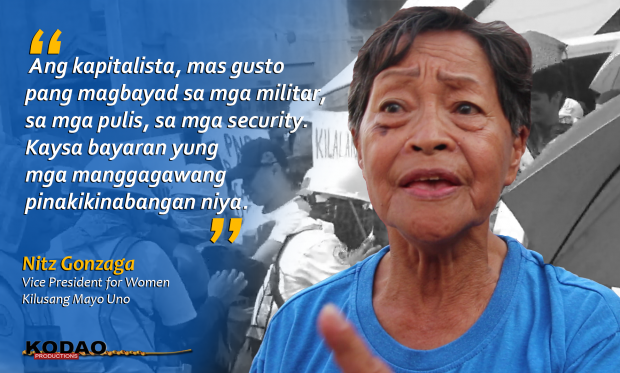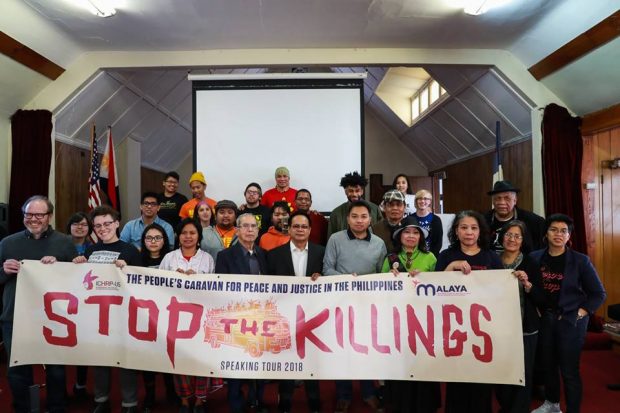Striking workers are parents too
By Sanafe E. Marcelo

“I will do everything to send my children to school. I do not want them to experience this kind of difficult work,” said Marifor Busadre, 32, a mother of four and a contractual worker of Peerless Manufacturing Company (Pepmaco) for three years running.
Mariflor endures all kinds of pain at work, such as skin rashes because of direct contact with strong chemicals used for the manufacture of Pepmaco’s detergent products such as Champion. As a packer, she received P375 per day including overtime work. Her wage, way below the mandated minimum, is not enough to feed her family and it is a daily struggle to keep aside money for their other expenses such as her children’s school supplies. Her eldest is in high school.
Being a contractual worker worries her no end. “I joined this strike to fight for our rights. I am getting old. I hope that the management will grant our demand to make us regular workers and allow us back to work,” she said.
Marifor and dozens of other Pepmaco Workers Union members launched their strike last June 24. Aside from poor pay and being kept as contractual workers, they also complain of dire working conditions.

Like Marifor, Christine Sudoy, 22, is a three-year contractual worker, a mother and her family’s breadwinner. “I am worried that I can’t support the financial needs of my family. I am also worried for our health safety and work security,” Christine said, explaining why she too joined the strike. Christine said they often feel they were not being treated as humans, but as work animals and machines.
The company, she said, ordered them not to use gloves in handling the chemicals “because the products may be affected.” There were also no face masks provided, the management saying these cost too much at around P1,000 per piece. They work 12-hour shifts and days-off are prohibited. Women in the packing section carry around 11,000 kilos a day and only receive P610 a day, including overtime work.
Aside from Champion detergent, Pepmaco also manufactures Systema toothpaste, Calla fabric conditioner, and Hana shampoo and hair conditioner.
Even if they do not succeed with their strike, Christine hopes things would be better for future Pepmaco workers. “I hope they do not experience the violations we suffered,” she said.
In the early hours of June 28, just four days into their strike, “goons wearing face masks and in full battle gear” arrived on board two vans and container vans and swooped down on the strikers’ camps while most of them were resting or sleeping. Eleven of the strikers were injured in the attack.

Romeo Aldamar, 33, nearly two years on the job as a contractual worker, was badly wounded when their picket line was attacked by company guards. “I was hit on the head, my skull and nose had bone fractures. The goons kept on spraying jets of water at me even if they could clearly see I was already bloodied,” he said.
Romeo’s wife, though still supportive of the workers’ strike, asked him to stop. But Romeo said he explained to her that he could not. “I will still stand together with the union to fight for our rights. I do this for our children,” he said.
Romeo dreams of sending his children to school and for them to finish college degrees. He said it is difficult for high school graduates like himself to find jobs. “I will endure anything for them. I wish they would never experience working in a factory like Pepmaco,” he said. #



